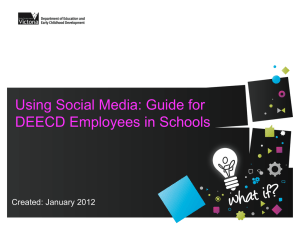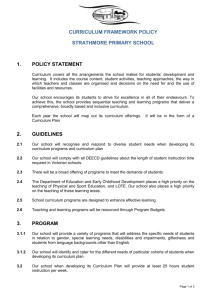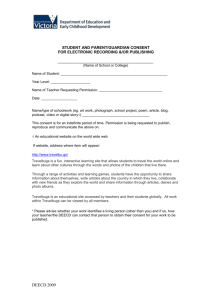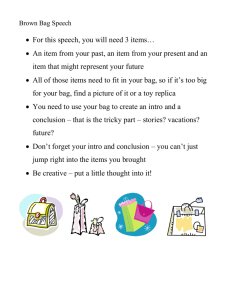Word (docx - 360.28kb) - Department of Education and Early
advertisement
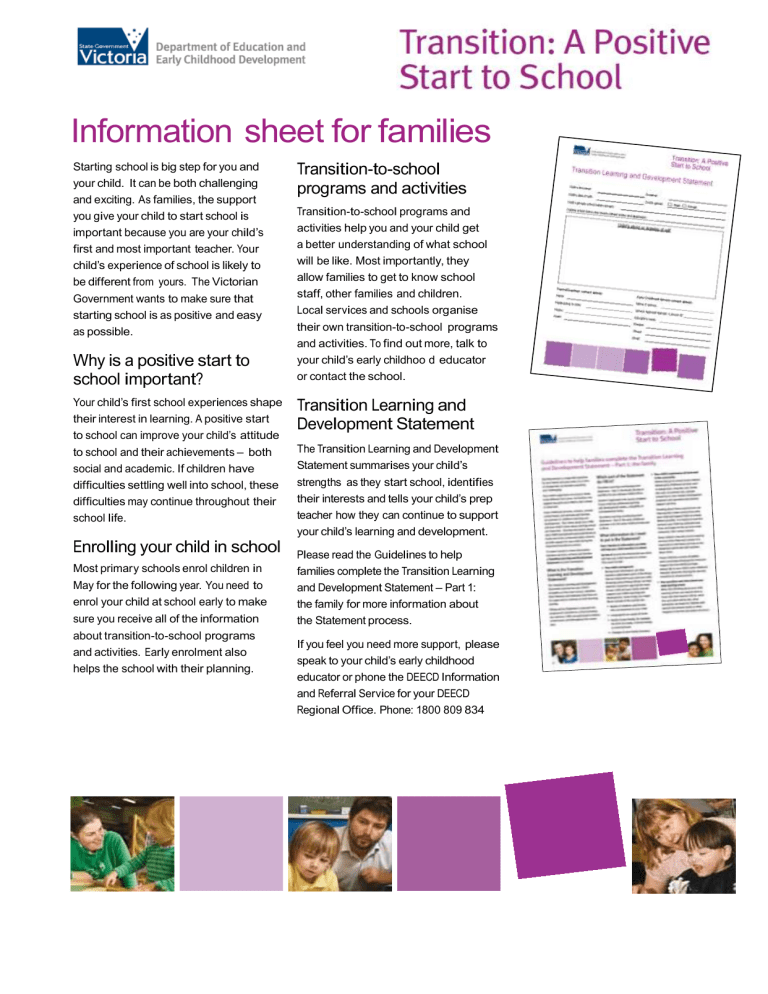
Information sheet for families Starting school is big step for you and your child. It can be both challenging and exciting. As families, the support you give your child to start school is important because you are your child’s first and most important teacher. Your child’s experience of school is likely to be different from yours. The Victorian Government wants to make sure that starting school is as positive and easy as possible. Why is a positive start to school important? Your child’s first school experiences shape their interest in learning. A positive start to school can improve your child’s attitude to school and their achievements – both social and academic. If children have difficulties settling well into school, these difficulties may continue throughout their school life. Enrolling your child in school Most primary schools enrol children in May for the following year. You need to enrol your child at school early to make sure you receive all of the information about transition-to-school programs and activities. Early enrolment also helps the school with their planning. Transition-to-school programs and activities Transition-to-school programs and activities help you and your child get a better understanding of what school will be like. Most importantly, they allow families to get to know school staff, other families and children. Local services and schools organise their own transition-to-school programs and activities. To find out more, talk to your child’s early childhoo d educator or contact the school. Transition Learning and Development Statement The Transition Learning and Development Statement summarises your child’s strengths as they start school, identifies their interests and tells your child’s prep teacher how they can continue to support your child’s learning and development. Please read the Guidelines to help families complete the Transition Learning and Development Statement – Part 1: the family for more information about the Statement process. If you feel you need more support, please speak to your child’s early childhood educator or phone the DEECD Information and Referral Service for your DEECD Regional Office. Phone: 1800 809 834 Tips for Transition The year before school • Ask your child what they think about starting school. Encourage your child to ask questionsabout going to school. • Help your child stay healthy. Make sure they have regular health and dental checks and keep immunisations up-to-date. • Practise the things your child will need to do to get ready for school (e.g. putting things in their bag, remembering to take a hat). • If your child is having difficulty at school, talk to their teacher. Your child can also say what they think might help them. • Confirm your before or after school care arrangements. Show your child where the outside school hours care facilities are and talk about how they will get there. Keep talking to your child about school. Ask them about their new experiences, what they like and what they find hard. Be positive about starting school and enjoy your child’s excitement. • Encourage your child to try to do things on their own such as dressing, going to the toilet, washing their hands, unwrapping their food and opening and closing their drink bottle. Visit your local library and read books with your child about starting school. • Talk to friends and other families about what school is like. • Make sure your child knows who will take them to school and pick them up on the first day. • Attend transition-to-school programs and activities at your child’s early years service and school. • Talk to your child’s early childhood educator about things you can do at home to help your child’s learning and development. • Talk to the school about how you can engage in your child’s learning and development at school. Ask the school what time your child starts on the first day and where to take them. During the summer holidays • Show your child where the school is and talk about how you will get there. • Arrange play-times with other families whose children will be going to the same school as your child. It helps if your child knows another child at their school at the start of prep. • If your child attends an outside school hours care service, find a way of sharing your child’s school progress with the staff. • Share feedback about your child’s experience of starting school with the school and early childhood service. The first day of school Lay out your child’s clothes, hat, shoes and socks the night before. • Help your child to pack their school bag with a snack, drink, lunch and a hat. Place a spare pair of underpants and a change of clothes in a plastic bag. Let your child know these clothes are in their bag in case of any accidents at school. • Put sunscreen on your child in the morning if it is needed. • Organise time for your child and their new friends to play together outside of school. For more information Please visit www.education.vic.gov.au/ earlylearning/transitionschool or phone the DEECD Information and Referral Service for your DEECD Regional Office. Phone: 1800 809 834 This document has been translated into 21 community languages which are available at www.education.vic. gov.au/earlylearning/transitionschool/ profresources/caldresources.htm • Show your child where you will meet them at the end of the school day. At the end of the day talk to your child about what happened at school. The first year of school • Find out about what your child is learning at school. By doing this, you can support your child’s learning and find out how your child is adjusting to school. © Copyright Department of Education and Early Childhood Development, Melbourne, August 2010 2 Treasury Place, East Melbourne, 3002
